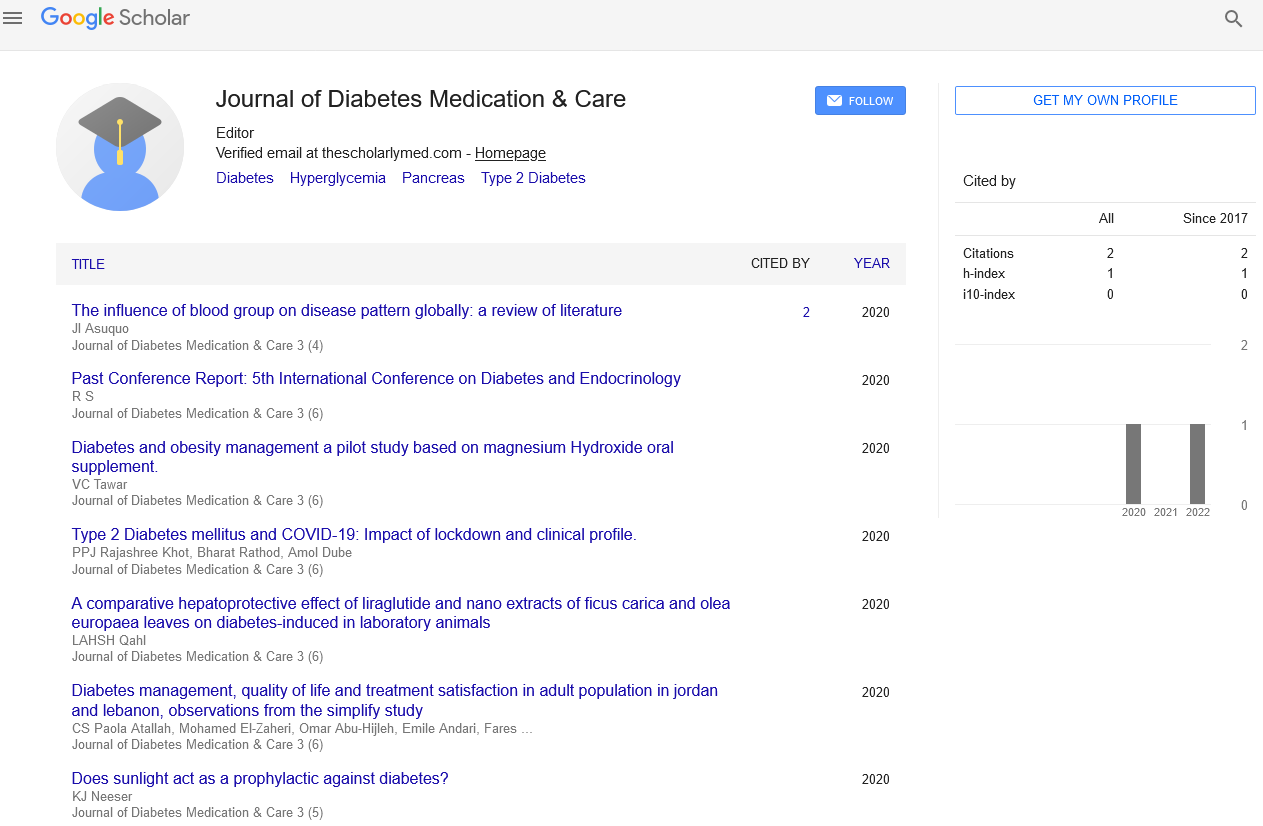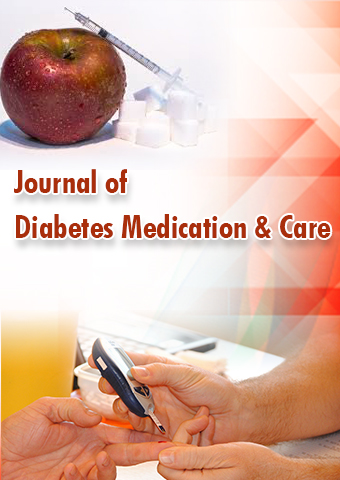Short Communication - Journal of Diabetes Medication & Care (2023) Volume 6, Issue 2
Regular Living with Diabetes Portrayed by Family Individuals of Grown-up Individuals with Type 1 Diabetes
Atmam*
Centre of Development & Diabetes Care, University of Albania
- *Corresponding Author:
- Atmam
Centre of Development & Diabetes Care, University of Albania
E-mail: mam@t.edu.in
Abstract
The aim of this study was to explore family members’ experiences of daily living in families with adults with type 1 diabetes. An informed theoretical method was used to collect data. and analyzed data from interviews with nineteen family members. Six concepts that describe family members’ perspectives on everyday life with diabetes were generated based on data. Daily life with diabetes is described as being associated with hypoglycemia. Knowledge about diabetes is done little by little. Engaging in self-management and observing self-management from the outside are concepts that describe the involvement of family members in the day-to-day management of diabetes. Family members also incorporate diabetes into their daily lives. Live on an emotional roller coaster that captures the thoughts and feelings that family members have gone through. Family members of adults with diabetes are involved in diabetes management in many ways and have many concerns. The views of family members are important to consider when developing education for adults with diabetes.
Keywords
Diabetes • Hypoglycemia • Adults
Introduction
Diabetes is one of the most common chronic diseases in the world. The goal of diabetes management is good control of metabolism and prevention of diabetes-related complications. Self-management plays an important role in diabetes management. It is also recognized that family plays an important role in diabetes management. The importance of the relationship between parents and children with diabetes is well documented. In addition, parental support has been shown to improve diabetes control and self-management in children and adolescents. During adolescence, cooperation with parents decreases and people with type 1 diabetes take responsibility for self-management. However, family members can provide practical help with daily diabetes management for adults with diabetes, as well as support and encouragement to follow the diet throughout [1]. While family influences self-management of diabetes, one family member’s diabetes also affects other family members. Parents of children with diabetes describe how their life has been different after being diagnosed with diabetes and has not been as easy as it used to be; they lose their freedom. On the one hand, they feel healthy and confident; on the other hand, the child is visibly sick leaving them feeling insecure and worried about the future. Parents also have long-term emotional responses to diabetes, even years after diagnosis. With regard to adults with diabetes, it has been shown that family members view diabetes as a more serious illness than those with diabetes themselves. Family members experience different fears and anxieties related to diabetes. They live with constant anxiety for the health of their diabetics and uncertainty about the future. Concern about hypoglycemia is a diabetes-specific problem that couples living with type 1 diabetes. In the study, family members even remembered multiple episodes of severe hypoglycemia. In addition to anxiety; family members have lower levels of positive happiness than people with diabetes. In her research, Fisher found that the sexual partners of people with type 2 diabetes experienced even higher levels of psychological distress than those with diabetes themselves [2-5]. This is especially true when it comes to female partners. Family members also seem to think that diabetes is a serious illness that cannot be controlled. Maintaining a good metabolic balance on a daily basis is also a challenge for family members]. In a systematic review of the effectiveness of family interventions, they found that people with diabetes had better metabolic control when their spouses participated in the intervention. Family members want to be involved in diabetes management and support, but they also need knowledge about diabetes treatment and emotional support and information. We know that family relationships can be an important source of support for someone with diabetes. It is well known that by causing fear and anxiety, diabetes affects family members as well. Self-management of type 1 diabetes can be even more difficult than self-management of type 2 diabetes because of the more demanding insulin therapy and blood sugar self-monitoring, and support from Family members are very important [6].
Hypoglycemia
The risk of hypoglycemia is always present in the minds of family members. Over the years, they have learned to recognize the signs of impending hypoglycemia. They recognize hypoglycemia based on very mild signs, such as the behavior of a person with diabetes. They even notice these signs earlier than people with diabetes themselves. Family members have arranged various ways to avoid hypoglycemia, such as carefully planning their daily schedule. They are also prepared for hypoglycemia in different ways. They always carry candy with them, in addition to having something edible throughout the house, such as candy in the kitchen cupboard or jelly on the bedside table. Family members also offered to help diabetics during low blood sugar. They encourage people with diabetes to check their own blood sugar, or they encourage people with diabetes to eat fast-acting carbohydrates. Family members even feed diabetics if they cannot feed themselves. Family members often fear severe hypoglycemia, especially those who have had severe hypoglycemia in the past. Learning about diabetes is a long process [7-9]. At the beginning of their relationship, spouses of people with diabetes had very little information about diabetes. They found that they needed more information about the characteristics of diabetes and its treatment. Little by little information gathering from different sources and self-education are methods that family members use to familiarize themselves with the nature of the disease and the basics of treatment. Family members get most of their diabetes information from people with diabetes. Only a few of them had attended diabetes education at a medical center or hospital. In small doses, people with diabetes talked about the care requirements, showed how to use the device, and explained how to operate in acute situations [10].
Family members interested in participating in diabetes management. They want to better understand diabetes self-management so they can be more supportive of people with diabetes. They showed an interest in the processing equipment and how it worked. Family members participate in daily diabetes self-management by offering practical help. They occasionally inject insulin for people with diabetes and occasionally take blood sugar measurements on behalf of people with diabetes. They pick up treatment materials on behalf of people with diabetes and remind them about blood sugar measurements, diet, or exercise. Family members have shared healthy diets with people with diabetes – no need to prepare different foods for other family members. Family members feel that diabetes is too big and difficult to manage, and they find that it limits their daily lives. Special careful planning for daily living is necessary to meet the daily needs of diabetes and its treatment. The duration of insulin action must be considered, and daily activities must often be carefully planned, such as the timing of meals and exercise. Above all, family members must live according to the schedule without any exceptions.Discussion
Daily life with diabetes includes many concerns related to diabetes. The risk of hypoglycemia is always on the mind of family members. They feel scared when they have low blood sugar, try to avoid it by all means, prepare for it, and recognize it based on very small signs. Family members are also afraid that something bad will happen or that diabetics will have complications for a long time. Previous studies have also revealed that family members experience different types of fear and even more than those with diabetes themselves. Family members also consider hypoglycemia more severe than someone with diabetes. Embracing self-management is a lifelong process for people with diabetes and their family members. There are many barriers to optimal diabetes self-management that people with diabetes face. Self-management is influenced by a number of factors, such as a person’s emotions, attitudes, self-efficacy, knowledge and skills, and motivation. In addition, the support of family members is very important. In this study, family members wanted to be involved in diabetes management. Similar outcomes were found by Stödberg. To support someone with a family member with diabetes, they need knowledge and education. In this study, family members felt a lack of knowledge. However, they did not have the opportunity to participate in education. For them, the only educator involved in diabetes is the sufferer. In their review, Armor found that interventions that involve family members can be effective in improving glycemic knowledge and control. However, little is known about the types of methods that are effective in family interventions.
Conclusion
The outcomes of this study provide different insights into the daily lives of families affected by diabetes and how family members of adults with diabetes live their lives. It’s important to remember that adults with type 1 diabetes do not live in a vacuum. Many of them have family members that are important to consider in overall diabetes management. These findings are valuable for expanding education and figuring out how best to help adults with diabetes and their families face the challenges of living with diabetes. More research is needed from the perspective of people with type 1 diabetes and their expectations of family members. Also, the experiences of children regarding their parents’ diabetes will be interesting to learn.
References
- Giorgino F, Laviola L, Cavallo PD et al. Factors associated with progression to macro albuminuria in microalbuminuric type 1 diabetic patients. Prospective Compli Stu Diabetologia. 47, 1020-1023(2004).
- Currie Craig J, Peters John R, Tynan Aodán et al. Survival as a function of HbA1c in people with type 2 diabetes: a retrospective cohort study. The Lancet. 375, 481-489 (2010).
- Heller, Simon R. A Summary of the Advance Trial. Diabetes Care. 32, 357-361 (2009).
- Gerstein HC, Miller ME, Byington RP et al. Effects of Intensive Glucose Lowering in Type 2 Diabetes. NEJM. 358, 2545-2559.
- Nathan DM, Kuenen J, Borg R et al. Translating the A1C assay into estimated average glucose values. Diabetes Care. 31, 1473-1478.
- Sun J, Buys NJ. Glucose- and glycaemic factor-lowering effects of probiotics on diabetes: a meta-analysis of randomised placebo-controlled trials. British Journal of Nutrition. 115, 1167-1177 (2016).
- Bunn HF, Higgins PJ. Reaction of monosaccharides with proteins: possible evolutionary significance. Science. 213. 222-224 (1981).
- Miedema K. Standardization of HbA1c and Optimal Range of Monitoring. Scand J Clin La Investig 240, 61-72 (2005).
- Warman DJ, Jia H, Kato H et al. The Potential Roles of Probiotics, Resistant Starch, and Resistant Proteins in Ameliorating Inflammation during Aging (Inflammaging). Nutrients. 14, 747 (2022).
- Alicic RZ, Rooney MT. Diabetic kidney disease: challenges, progress, and possibilities. Clin J Am Soc Nephrol.12, 342-356 (2017).
Indexed at, Google Scholar, Crossref
Indexed at, Google Scholar, Crossref
Indexed at, Google Scholar, Crossref
Indexed at, Google Scholar, Crossref
Indexed at, Google Scholar, Crossref
Indexed at, Google Scholar, Crossref
Indexed at, Google Scholar, Crossref
Indexed at, Google Scholar, Crossref
Indexed at, Google Scholar, Crossref

